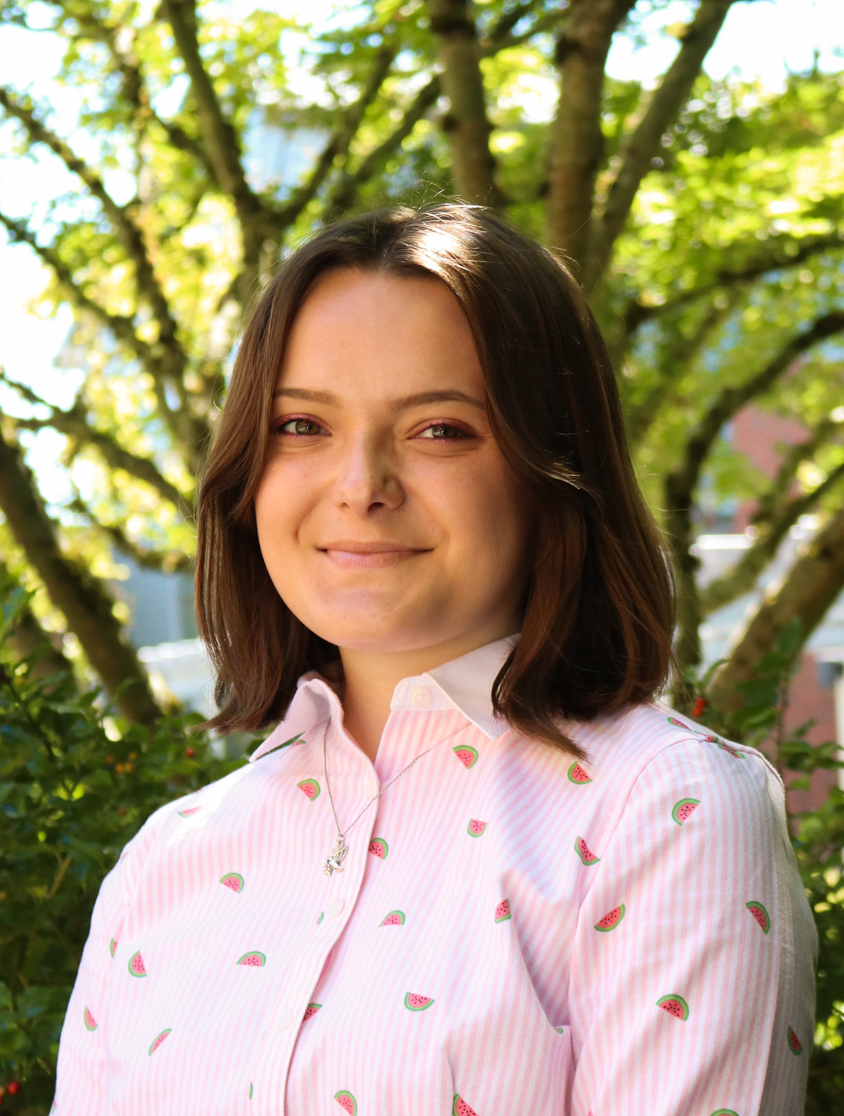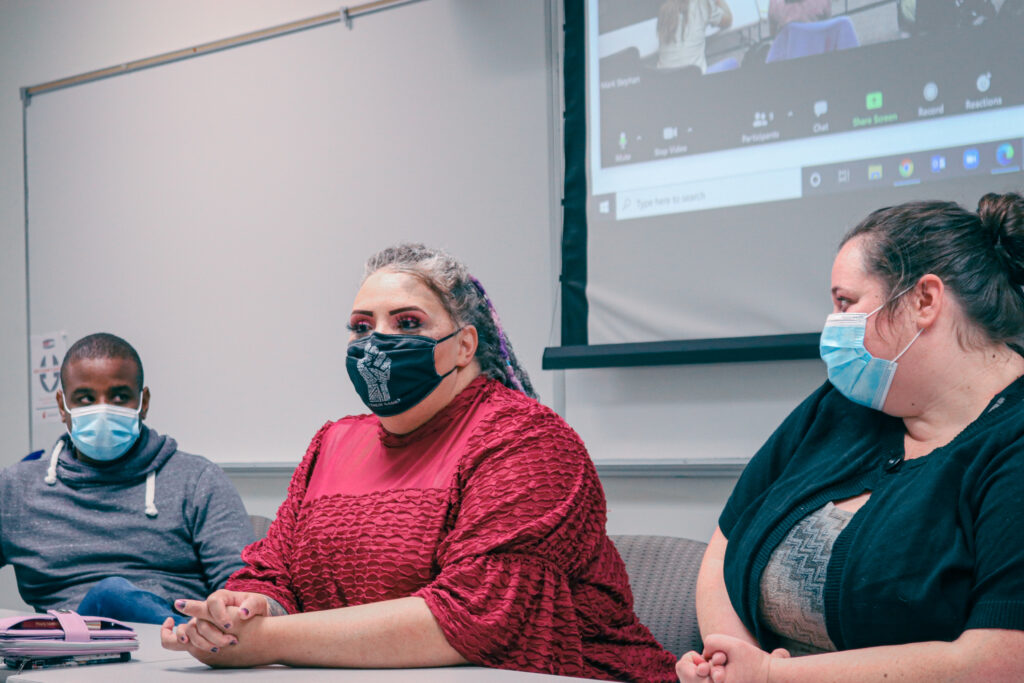Anyone who has a passion for encouraging social change can be an activist. Highlighting powerful perspectives from justice advocates in the Clark County area, the Collective for Social and Environmental Justice at WSU Vancouver hosted a panel with three community members who shared their activist experiences in the fight against systemic racism, and brought forward awareness toward police accountability.
On Sept. 22, the panel discussion titled, “Police Accountability in Clark County” was held in WSU Vancouver’s Multimedia Classroom Building. Attendees in person and over Zoom gathered to listen to the speakers’ words, as they defined a need for change in the police force and amplified justice for People of Color.
The panelist included: Nicolette Horaites, program manager with The Noble Foundation, a local nonprofit for Black Indigenous People of Color that addresses social and environmental justice, Faith Lightsy, an activist speaking out against injustice and spreading awareness about police accountability and James Tolson, founder of Concerned Humans Against Poverty, a nonprofit organization that supports those living in poverty.
“I could understand what was happening and who those cops were, in an intellectual way to approach my understanding of systemic racism, and it was not until I stood there and saw it with my own eyes. I had no idea.” – Nicolette Horaites
Tolson began by sharing several points, including how communities excessively rely on the police, and further instilled that cops should be held accountable for their actions. Often, people call the police when they feel threatened or disrupted in public spaces, however, doing so can lead to certain consequences. He said it is important to recognize the job description of a police officer, and rather, provide other resources through social work or crisis counseling to solve a situation verbally instead of through force.
“The nature of it, when you see someone incoherently screaming out into the crowd, you want to call the police because they need to help, but part of police accountability is reckoning with the fact that we are asking the police to do too much. If we want to keep them, if we want to have police be accountable, we must be accountable with ourselves and reckon with the fact that we call them for everything,” Tolson said. “Out of several situations, [houseless people] are going to be met with police, when one should be met with a social worker and one should be met with a crisis counselor.”

Lightsy elaborated on Tolson’s statement by explaining police brutality is a result of asking police to do more than they are capable of doing, where there should instead be a reallocation of funds and resources, alongside effective training.
“We are setting them up to fail too, we are trying to hold them accountable to standards or expectations they’re never going to meet, because nobody can be all the things to all the people all the time. When I say defund the police, I mean redistribute the wealth,” Lightsy said. “Police have options outside of lethal force, they don’t necessarily use them, but they have those options. Right now, there aren’t a whole lot of alternatives for what to do when a person is in distress.”
Horaites also explained how calling the police results in calling a gun, regardless of intention. She said reimagining police accountability also comes from a grassroots space and activism that creates conversations with community input to change issues, and through her activism by pulling public records, Horaites revealed what use of force by police officers looks like in Clark County.
“You are calling in a gun, and the most honest thing that a police officer ever told me was ‘we don’t fix problems, we move them.’ That has definitely resonated [with me]. … One of the things that I do in my activism is I pull public records, and from there I find out what use of force looks like in Clark County, what are the conversations that are had, what do the reports look like, where can we find the bias,” Horaites said.
For all of the panelists, sharing their experiences in the field of activism had amplified their message encouraging police accountability. After attending her first protest in Esther Short Park in Vancouver, and protesting later in Portland in response to the death of George Floyd last year, Lightsy laid on the ground with her hands behind her back for eight minutes and 46 seconds, which impacted her firsthand understanding of police brutality during a protest. Horaites also attended protests in Portland and marched in the streets, which she stated, highly influenced her awareness of systemic racism.
“Remember their names, always say their names,” Horaites said. “I could understand what was happening and who those cops were, in an intellectual way to approach my understanding of systemic racism, and it was not until I stood there and saw it with my own eyes. I had no idea.”

As an attendee of the event, Chelsea Ratzlaff, English literature instructor and organizer with the Collective for Social and Environmental Justice at WSU Vancouver, said panels like this are crucial when addressing issues such as police accountability and mass incarceration in the U.S., especially when teaching students about these issues directly on campus.
“This panel is important in particular not only because of the police killings we have seen in our own community and across the country, but because these speakers can connect these social movements at their intersections, with climate activism that is related to police accountability, how poverty and houselessness is related to police accountability,” Ratzlaff said. “Take all the broad swaths of these problems that everybody is feeling overwhelmed by, and recognize where we are on positionality, and how all these things are connected, it builds community understanding with those intersections, and helps us feel empowered to know what we can do to help.”
For up-and-coming activists who want to join the movement to combat institutionalized racism and influence avenues of change, Lightsy said there are many ways to incite real progress, while recognizing that you are part of a much bigger system.
“It’s the ownership, when we as individuals take ownership, I say this is my city, this is my house let’s start small. … That’s how you create the ripple effect, do what you can in your home, do what you can on your street,” Lightsy said. “We all have different strengths and we all have different weaknesses, and we all have different capabilities. If each of you does your part, then the work is easy, and we can just focus on getting the work done.”

Olivia is a senior studying English at WSU Vancouver.
